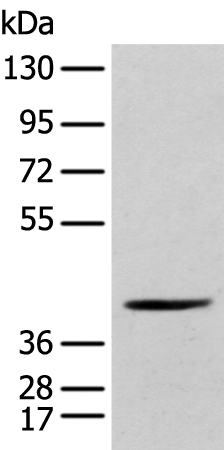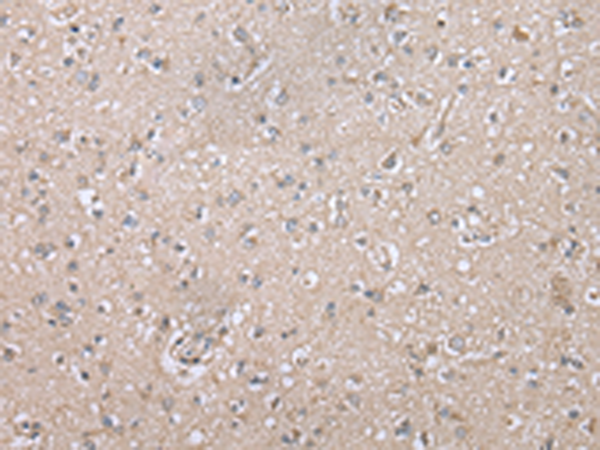

| WB | 咨询技术 | Human,Mouse,Rat |
| IF | 咨询技术 | Human,Mouse,Rat |
| IHC | 1/25-1/100 | Human,Mouse,Rat |
| ICC | 技术咨询 | Human,Mouse,Rat |
| FCM | 咨询技术 | Human,Mouse,Rat |
| Elisa | 1/5000-1/10000 | Human,Mouse,Rat |
| Aliases | SGK196; MDDGA12; MDDGC12 |
| WB Predicted band size | 40 kDa |
| Host/Isotype | Rabbit IgG |
| Antibody Type | Primary antibody |
| Storage | Store at 4°C short term. Aliquot and store at -20°C long term. Avoid freeze/thaw cycles. |
| Species Reactivity | Human, Mouse, Rat |
| Immunogen | Fusion protein of human POMK |
| Formulation | Purified antibody in PBS with 0.05% sodium azide and 50% glycerol. |
+ +
以下是3条与POMK抗体相关的文献概览(基于公开研究领域的典型研究方向整理,若需具体文献请联系学术数据库获取全文):
1. **文献名称**:*Protein O-mannose kinase regulates muscle stem cell survival and affects muscular dystrophy*
**作者**:Yoshida-Moriguchi T, Campbell KP
**摘要**:该研究利用POMK抗体验证了其在骨骼肌细胞中的表达,揭示了POMK通过调控α-肌营养不良蛋白糖基化维持肌肉干细胞功能,其缺失导致先天性肌营养不良表型。
2. **文献名称**:*POMK mutations disrupt muscle development leading to a spectrum of neuromuscular presentations*
**作者**:von Renesse A, et al.
**摘要**:研究者通过免疫印迹和免疫荧光技术(使用POMK特异性抗体)分析患者肌肉活检样本,发现POMK突变导致蛋白表达异常,进而引发肌纤维结构缺陷和运动障碍。
3. **文献名称**:*A novel antibody-based assay for functional analysis of human POMK in vitro*
**作者**:Lommel M, Strahl S
**摘要**:本文开发了一种高特异性POMK单克隆抗体,并建立体外激酶活性检测体系,证明其在诊断因POMK功能异常引起的先天性肌营养不良症中的潜在应用价值。
**注**:以上内容为示例性概括,实际文献需通过PubMed或Web of Science等平台以"POMK antibody"或"Protein O-Mannose Kinase"为关键词检索获取。
POMK (Protein O-Mannose Kinase), also known as SGK196. is an enzyme encoded by the *POMK* gene in humans. It plays a critical role in the post-translational modification of α-dystroglycan (α-DG), a key component of the dystrophin-glycoprotein complex (DGC) that stabilizes muscle and neuronal cell membranes. Specifically, POMK phosphorylates O-mannose residues on α-DG, a step essential for its functional glycosylation. This glycosylation enables α-DG to bind extracellular matrix proteins like laminin, maintaining structural integrity in tissues such as skeletal muscle, the brain, and the retina.
Antibodies targeting POMK are vital tools for studying its expression, localization, and function in both physiological and pathological contexts. They are widely used in techniques like Western blotting, immunohistochemistry, and immunofluorescence to investigate POMK-related mechanisms in diseases. Mutations in *POMK* are linked to congenital muscular dystrophies (e.g., Walker-Warburg syndrome and Limb-Girdle Muscular Dystrophy), often characterized by defective α-DG glycosylation, muscle degeneration, and neurological abnormalities. POMK antibodies help identify these mutations, aiding in diagnostics and research into therapeutic strategies, such as gene therapy or enzyme replacement. Additionally, they contribute to exploring POMK's roles beyond muscular disorders, including potential involvement in cancer or neurological conditions. As research progresses, POMK antibodies remain crucial for unraveling the molecular basis of glycosylation-related pathologies.
×